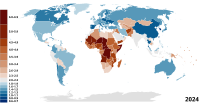
Photo from wikipedia
ABSTRACT In this study, the fertility changes are examined through the combining political and economic aspects of Turkey. For this purpose, it examines if a long-run relationship between economic and… Click to show full abstract
ABSTRACT In this study, the fertility changes are examined through the combining political and economic aspects of Turkey. For this purpose, it examines if a long-run relationship between economic and institutional variables and fertility rates of Turkey exists. The long-run relations between income, democracy, polarization, government spending, and fertility rates will thus be analyzed through the Autoregressive Distribute Lag (ARDL) cointegration technique. The results reveal that per capita income, government expenditure, and democracy are one of the key determinants of fertility. Per capita income and government expenditure are negatively associated with fertility, but democracy is positively associated with fertility. The results further showed that the fertility decline is robust after the implementation of compulsory education policy in 1997. The study enlightens the long run effect of government on fertility behavior either through policy implementation or government expenditure, but the association between fertility and institutions in Turkey is rather vague.
Journal Title: International Journal of Public Administration
Year Published: 2019
Link to full text (if available)
Share on Social Media: Sign Up to like & get
recommendations!